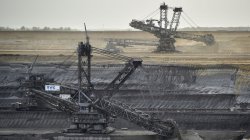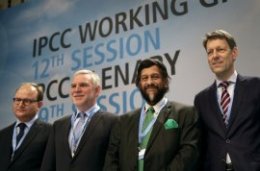Why stop global warming?
 The window of opportunity to avoid an amount of global warming that global leaders have agreed would be “dangerous” is rapidly closing, with just a decade left for the world to begin undertaking sweeping technological and governmental actions to rein in emissions of global-warming gases such as carbon dioxide, according to a new United Nations report released Sunday in Berlin. After that, it becomes far more difficult and expensive to cut emissions sufficiently to avoid dangerous amounts of warming.
The window of opportunity to avoid an amount of global warming that global leaders have agreed would be “dangerous” is rapidly closing, with just a decade left for the world to begin undertaking sweeping technological and governmental actions to rein in emissions of global-warming gases such as carbon dioxide, according to a new United Nations report released Sunday in Berlin. After that, it becomes far more difficult and expensive to cut emissions sufficiently to avoid dangerous amounts of warming.
Given recent emissions and temperature trends, the world is on track to see an increase in global average surface temperatures of up to 9 degrees Fahrenheit by the end of this century, the report says. This could have disastrous consequences by dramatically raising global sea levels, melting land-based ice sheets, and leading to more heat waves and extreme precipitation events, among other impacts.
The report, the third and final installment of the latest comprehensive review of climate science from the Nobel Prize-winning UN Intergovernmental Panel on Climate Change’s (IPCC), analyzes more than 1, 000 scenarios of potential economic growth and environmental changes to determine how to minimize global warming.
 The report is simultaneously optimistic and grim in tone, since it concludes there is time and pre-existing technological knowledge available to meet the goals that leaders set out in a non-binding agreement in 2009, yet lays bare the sheer scope of the challenges that lie ahead.
The report is simultaneously optimistic and grim in tone, since it concludes there is time and pre-existing technological knowledge available to meet the goals that leaders set out in a non-binding agreement in 2009, yet lays bare the sheer scope of the challenges that lie ahead.
Ottmar Edenhofer, co-chairman of the IPCC Working Group III, Jochen Flasbarth, State Secretary of the German Environment Ministry, Rejendra K. Pachauri, chairman of the IPCC and Jochen Schuette, State Secretary of the German Science Ministry, from left, pose for the media prior to a meeting of the UN IPCC in Berlin, Germany on April 7, 2014.
Image: Michael Sohn/Associated Press
The central task for scientists, engineers and policymakers is to figure out how to facilitate continued economic and population growth, without also causing emissions to skyrocket at the same time, the report says.

